formerly eScholarship Editions


|
|
|
|
Your search for
'Opera' in subject
found 7 book(s). | Modify Search | Displaying 1 - 7 of 7 book(s) | |
| 1. | 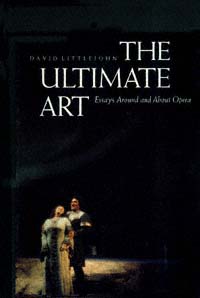 | Title: The ultimate art: essays around and about opera Author: Littlejohn, David 1937- Published: University of California Press, 1992 Subjects: Music | Opera Publisher's Description: Anyone who cares about opera will find The Ultimate Art a thoroughly engaging book. David Littlejohn's essays are exciting, provocative, sometimes even outrageous. They reflect his deep love of opera - that exotic, extravagant, and perpetually popular hybrid performing art form - and his fascination with the many worlds from which it sprang.From its seventeenth-century beginnings, opera has been decried by its detractors for its elitism, its artifice, its absurd costliness, and its social irrelevance. But Littlejohn makes us see that opera embraces an extraordinary amount of intense human emotion and experience, Western culture, and individual psychology. It is also the most complex, challenging, and demanding form of public performance ever developed - at its most spectacular it pulls together in one evening a play, a concert, a ballet, and a pageant, not to mention an exhibition of painting and sculpture. Every opera is a veritable piece of cultural history.The book begins with "The Difference Is They Sing," a potentially controversial essay on the nature of opera and its place in modern culture. From there Littlejohn goes on to consider everything from "Sex and Religion in French Opera" to "What Peter Sellars Did to Mozart." He tells us about every major staging of Wagner's Ring cycle since 1876, the troubled fate (in legend, history, and opera) of the city of Nuremberg, and the volatile collaboration of Richard Strauss and Hugo von Hofmannsthal.Littlejohn presents these and many other fascinating moments in the history of opera with conviction and flair. By the end of the book the reader may very well be persuaded that opera is indeed the ultimate art. [brief] Similar Items |
| 2. | 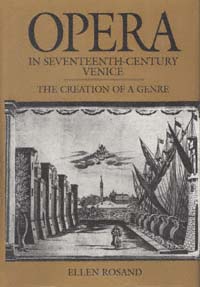 | Title: Opera in seventeenth-century Venice: the creation of a genre Author: Rosand, Ellen Published: University of California Press, 1990 Subjects: Music | Musicology | Opera | European History Publisher's Description: Ellen Rosand shows how opera, born of courtly entertainment, took root in the special social and economic environment of seventeenth-century Venice and there developed the stylistic and aesthetic characteristics we recognize as opera today. With ninety-one music examples, most of them complete pieces nowhere else in print, and enlivened by twenty-eight illustrations, this landmark study will be essential for all students of opera, amateur and professional, and for students of European cultural history in general.Because opera was new in the seventeenth century, the composers (most notably Monteverdi and Cavalli), librettists, impresarios, singers, and designers were especially aware of dealing with aesthetic issues as they worked. Rosand examines critically for the first time the voluminous literary and musical documentation left by the Venetian makers of opera. She determines how these pioneers viewed their art and explains the mechanics of the proliferation of opera, within only four decades, to stages across Europe. Rosand isolates two features of particular importance to this proliferation: the emergence of conventions - musical, dramatic, practical - that facilitated replication; and the acute self-consciousness of the creators who, in their scores, librettos, letters, and other documents, have left us a running commentary on the origins of a genre. [brief] Similar Items |
| 3. | 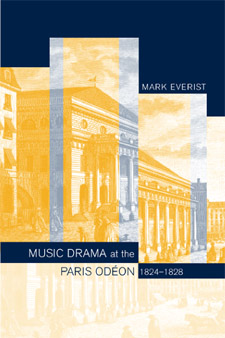 | Title: Music drama at the Paris Odéon, 1824-1828 Author: Everist, Mark Published: University of California Press, 2002 Subjects: Music | Musicology | Opera | French Studies | European History Publisher's Description: Parisian theatrical, artistic, social, and political life comes alive in Mark Everist's impressive institutional history of the Paris Odéon, an opera house that flourished during the Bourbon Restoration. Everist traces the complete arc of the Odéon's short but highly successful life from ascent to triumph, decline, and closure. He outlines the role it played in expanding operatic repertoire and in changing the face of musical life in Paris. Everist reconstructs the political power structures that controlled the world of Parisian music drama, the internal administration of the theater, and its relationship with composers and librettists, and with the city of Paris itself. His rich depiction of French cultural life and the artistic contexts that allowed the Odéon to flourish highlights the benefit of close and innovative examination of society's institutions. [brief] Similar Items |
| 4. | 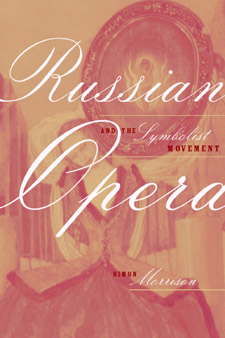 | Title: Russian opera and the symbolist movement Author: Morrison, Simon Alexander 1964- Published: University of California Press, 2002 Subjects: Music | Opera | Musicology | Composers | Russian and Eastern European Studies | Literature Publisher's Description: An aesthetic, historical, and theoretical study of four scores, Russian Opera and the Symbolist Movement is a groundbreaking and imaginative treatment of the important yet neglected topic of Russian opera in the Silver Age. Spanning the gap between the supernatural Russian music of the nineteenth century and the compositions of Prokofiev and Stravinsky, this exceptionally insightful and well-researched book explores how Russian symbolist poets interpreted opera and prompted operatic innovation. Simon Morrison shows how these works, though stylistically and technically different, reveal the extent to which the operatic representation of the miraculous can be translated into its enactment. Morrison treats these largely unstudied pieces by canonical composers: Tchaikovsky's Queen of Spades, Rimsky-Korsakov's Legend of the Invisible City of Kitezh and the Maiden Fevroniya, Scriabin's unfinished Mysterium, and Prokofiev's Fiery Angel. The chapters, revisionist studies of these composers and scores, address separate aspects of Symbolist poetics, discussing such topics as literary and musical decadence, pagan-Christian syncretism, theurgy, and life creation, or the portrayal of art in life. The appendix offers the first complete English-language translation of Scriabin's libretto for the Preparatory Act. Providing valuable insight into both the Symbolist enterprise and Russian musicology, this book casts new light on opera's evolving, ambiguous place in fin de siècle culture. [brief] Similar Items |
| 5. | 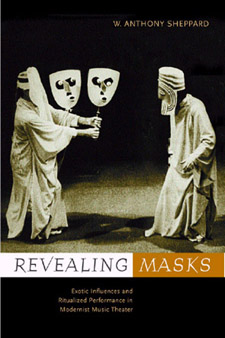 | Title: Revealing masks: exotic influences and ritualized performance in modernist music theater Author: Sheppard, William Anthony 1969- Published: University of California Press, 2001 Subjects: Music | American Music | Contemporary Music | Ethnomusicology | Opera | Musicology | Intellectual History Publisher's Description: W. Anthony Sheppard considers a wide-ranging constellation of important musical works in this fascinating exploration of ritualized performance in twentieth-century music. Revealing Masks uncovers the range of political, didactic, and aesthetic intents that inspired the creators of modernist music theater. Sheppard is especially interested in the use of the "exotic" in techniques of masking and stylization, identifying Japanese Noh, medieval Christian drama, and ancient Greek theater as the most prominent exotic models for the creation of "total theater." Drawing on an extraordinarily diverse - and in some instances, little-known - range of music theater pieces, Sheppard cites the work of Igor Stravinsky, Benjamin Britten, Arthur Honegger, Peter Maxwell Davies, Harry Partch, and Leonard Bernstein, as well as Andrew Lloyd Webber and Madonna. Artists in literature, theater, and dance - such as William Butler Yeats, Paul Claudel, Bertolt Brecht, Isadora Duncan, Ida Rubenstein, and Edward Gordon Craig--also play a significant role in this study. Sheppard poses challenging questions that will interest readers beyond those in the field of music scholarship. For example, what is the effect on the audience and the performers of depersonalizing ritual elements? Does borrowing from foreign cultures inevitably amount to a kind of predatory appropriation? Revealing Masks shows that compositional concerns and cultural themes manifested in music theater are central to the history of twentieth-century Euro-American music, drama, and dance. [brief] Similar Items |
| 6. | 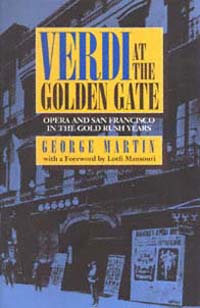 | Title: Verdi at the Golden Gate: opera and San Francisco in the Gold Rush years Author: Martin, George Whitney Published: University of California Press, 1993 Subjects: Music | History | Opera | Composers | American Studies | California and the West | European History Publisher's Description: Opera is a fragile, complex art, but it flourished extravagantly in San Francisco during the Gold Rush years, a time when daily life in the city was filled with gambling, duels, murder, and suicide. In the history of the United States there has never been a rougher town than Gold Rush San Francisco, yet there has never been a greater frenzy for opera than developed there in these exciting years.How did this madness for opera take root and grow? Why did the audience's generally drunken, brawling behavior gradually improve? How and why did Verdi emerge as the city's favorite composer? These are the intriguing themes of George Martin's enlightening and wonderfully entertaining story. Among the incidents recounted are the fist fight that stopped an opera performance and ended in a fatal duel; and the brothel madam who, by sitting in the wrong row of a theater, caused a fracas that resulted in the formation of the Vigilantes of 1856.Martin weaves together meticulously gathered social, political, and musical facts to create this lively cultural history. His study contributes to a new understanding of urban culture in the Jacksonian?Manifest Destiny eras, and of the role of opera in cities during this time, especially in the American West. Over it all soars Verdi's somber, romantic music, capturing the melancholy, the feverish joy, and the idealism of his listeners. [brief] Similar Items |
| 7. | 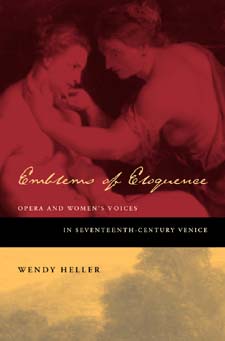 | Title: Emblems of eloquence: opera and women's voices in seventeenth-century Venice Author: Heller, Wendy Beth Published: University of California Press, 2004 Subjects: Music | European Studies | Opera | Classical Music | Women's Studies | Classical Literature and Language | Renaissance History Publisher's Description: Opera developed during a time when the position of women - their rights and freedoms, their virtues and vices, and even the most basic substance of their sexuality - was constantly debated. Many of these controversies manifested themselves in the representation of the historical and mythological women whose voices were heard on the Venetian operatic stage. Drawing upon a complex web of early modern sources and ancient texts, this engaging study is the first comprehensive treatment of women, gender, and sexuality in seventeenth-century opera. Wendy Heller explores the operatic manifestations of female chastity, power, transvestism, androgyny, and desire, showing how the emerging genre was shaped by and infused with the Republic's taste for the erotic and its ambivalent attitudes toward women and sexuality. Heller begins by examining contemporary Venetian writings about gender and sexuality that influenced the development of female vocality in opera. The Venetian reception and transformation of ancient texts - by Ovid, Virgil, Tacitus, and Diodorus Siculus - form the background for her penetrating analyses of the musical and dramatic representation of five extraordinary women as presented in operas by Claudio Monteverdi, Francesco Cavalli, and their successors in Venice: Dido, queen of Carthage (Cavalli); Octavia, wife of Nero (Monteverdi); the nymph Callisto (Cavalli); Queen Semiramis of Assyria (Pietro Andrea Ziani); and Messalina, wife of Claudius (Carlo Pallavicino). [brief] Similar Items |